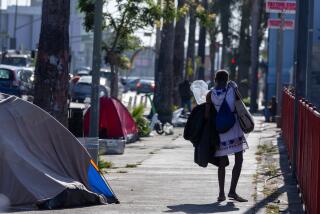Decision Time in Mean Streets of South L.A. : For Farrell, Author of Police Tax Plan, One Answer Is Due Tuesday
- Share via
Los Angeles City Councilman Robert Farrell, supposedly a safe incumbent in Tuesday’s election, is now caught up in a heated political battle--stung not so much by his opponents as by his own proposal for a special police protection tax.
The proposal does not go before voters on Tuesday, but it will two months from now in a large section of South Los Angeles.
Farrell, who has been the 8th District councilman since 1975, authored the controversial plan that would tax residents in crime-plagued neighborhoods to pay for adding 300 police officers over the next three years.
The tax proposal on the June 2 ballot, which Farrell single-handedly pushed through the City Council, would affect residents serviced by four Los Angeles Police Department divisions--Newton, Southwest, Southeast and 77th Street. Neighborhoods covered by these divisions include a large number of low-income blacks angry about rampant crime, and Farrell’s council district lies entirely within the proposed tax boundaries.
But Farrell’s tax plan has sparked a firestorm of protest from community groups inside and outside his district. Black organizations, individuals and political foes accuse the councilman of pushing an unwise, unpopular idea that places a financial burden on those who can least afford to pay.
Although Farrell is favored to win reelection Tuesday, his opponents--Mervin Evans, John S. Jackson, Earlene Walton-James, Alice M. Moore and Tony Parent--have profited from the controversy and hope to turn Tuesday’s election into a referendum on the police tax.
“There’s no question that it’s going to hurt him,” said Parent, who joined his fellow challengers in denouncing the plan. “It’s the most critical issue that has come aboard in years. People are outraged about the police tax.”
“He’s lost touch with the community,” said Jackson, “and what the community wants.”
Rap at Critics
Farrell, who has run a low-key reelection campaign, admitted that he will lose votes because of the issue but blamed it on his decision not to discuss the police tax plan until after the election. “There is no denying this is the only issue that my opponents can raise,” he said, adding that his critics “have manipulated the issue.”
Under the tax plan, which needs a two-thirds vote for passage in June, local property owners would pay higher rates on both improved and unimproved property. For the average homeowner, the increase would amount to an estimated $148 a year, according to city officials. For owners of commercial property, the average increase would be $288 a year, while industrial property would be billed an extra $829 annually.
Twice in recent years city voters have rebuffed tax measures that would have added as many as 1,500 police officers throughout Los Angeles. In 1985, a measure failed to win even a majority of support citywide, but in two council districts--Farrell’s 8th and Gilbert Lindsay’s adjoining 9th--67% of the voters approved the proposal.
Those figures helped persuade Farrell to pursue his tax plan idea. Also supporting it are some prominent church leaders including Bishop H. H. Brookins of the African Methodist Episcopal Church and the Rev. E. V. Hill of Mount Zion Baptist Church.
“The fact is that we have a (crime) epidemic,” Hill said Thursday. “What do you do in any epidemic? You try to get it under control.”
Gates Backs It
Police Chief Daryl F. Gates has said the extra tax is not an ideal solution, but he is backing it.
In a letter, Mayor Tom Bradley, who supported placing the measure on the June ballot, suggested that the tax plan “can make a huge difference in the level of safety on South Los Angeles streets.”
But in Bradley’s home district--the 10th Council District in the Southwest--nearly every candidate vying for the vacant council seat has criticized the tax plan. A portion of the 10th District would be affected by the tax. And such groups as the Los Angeles Urban League, the local NAACP chapter and the South-Central Organizing Committee have condemned the proposal.
“It will make this a second-class community that will not be able to compete with the affluent communities,” said Barbara Collins, co-chair of SCOC’s Committee Against the Farrell Police Tax.
Study Awaited
His critics also contend that Farrell did not consult with community leaders before embarking on his tax plan idea and they maintain that he should have waited until after a planned LAPD study on the deployment of police officers is completed, which is expected in a few months.
Last February, when Farrell brought his idea before the City Council, a number of members opposed the plan and balked at placing it before voters. But Farrell took the unusual step of personally lobbying each council member and made an emotional appeal to allow his constituents to vote on the idea. His colleagues responded by giving him the majority he needed to place the measure on the ballot, although some, like Councilman Zev Yaroslavsky, still personally oppose it.
“He was willing to stick his neck out,” Yaroslavsky said. “Conventional wisdom says that you don’t propose any tax increase while you’re on the ballot. I gave Bob that advice personally. But his feeling about this went beyond politics.”
More to Read
Sign up for Essential California
The most important California stories and recommendations in your inbox every morning.
You may occasionally receive promotional content from the Los Angeles Times.










